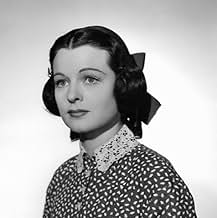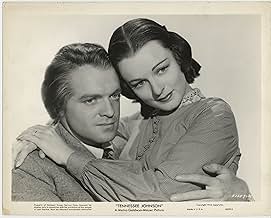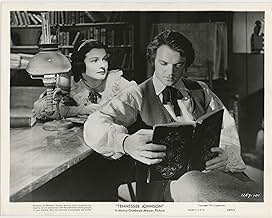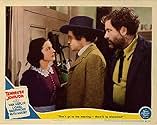Biography of Andrew Johnson, who followed Abraham Lincoln into office and became the first President of the United States ever to be impeached.Biography of Andrew Johnson, who followed Abraham Lincoln into office and became the first President of the United States ever to be impeached.Biography of Andrew Johnson, who followed Abraham Lincoln into office and became the first President of the United States ever to be impeached.
- Sheriff Cass
- (as Noah Beery Sr.)
Featured reviews
The liberties taken by the screenwriters to make Johnson into a shining patriotic hero were so egregious to some that a protest movement formed against this movie, leading to picket lines and angry print editorials. Strangely enough, the most vocal opponents to the movie were Vincent Price and Zero Mostel! The movie is mostly malarkey, but so were so many "history lessons" coming out of Hollywood, so this one doesn't offend me that much. The purpose was to inspire and celebrate rather than inform or educate. If only it succeeded more at the former the lack of the latter wouldn't be so noticeable. The movie is clunky in its pacing, and can't decide what it really wants to say about its protagonists. Heflin and Hussey do as good a job as they were able given the material, but many of the supporting cast are wasted in nothing roles. The production design is nice, with detailed settings and nice costume work. Running about 105 minutes long, the movie really needed another 30 or so to add more depth and nuance to the players.
"Robert Maxwell" wrote> It's generally agreed that at the second inauguration, Andrew Johnson was skunk drunk when he took the oath and tried to make his speech. I just watched the movie, "Tennessee Johnson," and it appears that Johnson was ill during the inauguration and that Lincoln later sent him a letter saying something like, "If you took a drink more often, you would know better than to take brandy on an empty stomach because you are ill. I know you only were there because I asked you to be."
Does anyone know if this letter ever existed?
Reply. "Having worked for three years as an assistant editor with The Papers of Andrew Johnson and as a member of the Board of Directors of the Abraham Lincoln Association, which is engaged in supporting projects to edit the papers of the sixteenth president, I can safely say that no one I know has ever claimed such a letter to exist."
Anyone interested in the impeachment of Johnson might watch the first 20 minutes of Blight's lecture on the subject, on open courses from Yale. Don't be intimidated by "college" or "Yale". (I went there and it's not that demanding.) Blight gives an informative, objective, and lively presentation of the material -- interrupted briefly by somebody yelling "Let my people go," to which Blight replies, "You're free to leave...I hope that guy doesn't have a gun."
http://academic earth.org/lectures/black-reconstruction-economics-of-land-and-labor
Please eliminate the space between "academic" and "earth". It's only there because IMDb.com doesn't allow words that are too long, like floccinaucinihilipilification.
I wonder what kind of career he would have had if he had lived longer.
Watch this movie with an open mind and really enjoy Heflin's acting.
Johnson was illiterate, until his wife taught him to read and write. He educated himself, and rose in the legal and political world of Tennessee (and then the nation). But he was a piece of "po' white trash", and remained so with all it's cultural baggage. He supported the North because he (rightly) distrusted the Southern plantation aristocracy (epitomized by Jefferson Davis). However - he hated slaves and free Black people. Hence his willingness to be soft on the South. Lincoln would have been soft too, but Lincoln had great gifts at managing his adversaries and probably could have arranged a compromise. Johnson was pig-headed. He antagonized the Radical Republicans controlling Congress. They waited for him to make a mistake, and he did (technically he violated the Tenure of Office Act, by firing Secretary of War Stanton without getting Congressional permission - this act was declared unconstitutional in the 1880s). Then followed his impeachment and the saving of his skin by seven Republican Senators who voted not to remove him. And those men all lost their Senatorial seats.
In 1943 Johnson was considered a hero, for saving the Executive Branch from becoming a rubber stamp for Congress. Actually, there was nothing to show that some Radical Republican President could not have restored power to the Executive Branch if Johnson had been removed. He gets high grades for his grit and courage, but his pig-headed stupidity and racism sink his historical rating.
Still Van Heflin, Lionel Barrymore, and the other actors (like Charles Dingle) make the film interesting and enjoyable enough. Good film making but mixed history. Two final points: Edmond Ross was in good health when he voted, but James W. Grimes of Iowa also voted for acquittal, and he had a paralytic stroke a few weeks earlier (he died within a year). Second: Andrew Johnson is the second Vice President of the name Johnson (and Lyndon Johnson the third Veep). The first was Martin Van Buren's Vice President, Richard Mentor Johnson of Kentucky, whose career as a politician might make a diverting comedy.
Did you know
- TriviaThere was a protest from some sectors that the film distorted the life of Thaddeus Stevens (who initiated the impeachment proceedings against President Andrew Johnson). Additional filming occurred in October 1942, but it is not known if it was because of these protests. One line in the script (Stevens referring to Lincoln as "the old ape") was eliminated. Still, the film treats Johnson much more favorably than it does Stevens.
- GoofsA key scene in the film depicts Johnson entering the Senate while it is debating his impeachment and removal from office, and making a major speech there in his defense. In reality, the actual President Johnson, despite his desire to confront his enemies in the Senate, never once entered or addressed that body during his impeachment trial.
- Quotes
Jefferson Davis: I must pronounce our solemn farewell. Under these circumstances, of course, my functions - and those of my colleagues - terminate here. We but tread in the path of our fathers when we proclaim our independence - and take the hazard, putting our trust in God, and in our own firm hearts - and strong arms - we will vindicate the right as best we may.
[looking slowly around the room]
Jefferson Davis: I see now around me some with whom I have served long; there have been points of collision. For whatever offense I have given, I ask forgiveness. Of whatever of offense there has been to me, I leave here. I carry with me no hostile remembrance. I go hence unencumbered of the remembrance of injury received, and having discharged the duty of making the only reparation in my power for any injury offered.
[pausing]
Jefferson Davis: Mr. President; Senators - having made the announcement which the occasion seemed to me to require - it remains only for my colleagues and myself to bid you a final - adieu.
- Crazy creditsThe opening outline includes a disclaimer about historical facts being changed for entertainment purposes.
- ConnectionsReferenced in Sheldon Hall on Omar Khayyam (2023)
- SoundtracksThe Battle Cry of Freedom
(1862)
Written by George Frederick Root
In the score during the foreword, reprised in the score for the last scene
Details
- Release date
- Country of origin
- Language
- Also known as
- The Man on America's Conscience
- Filming locations
- Production company
- See more company credits at IMDbPro
- Runtime1 hour 43 minutes
- Color
- Aspect ratio
- 1.37 : 1
Contribute to this page







































